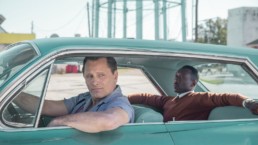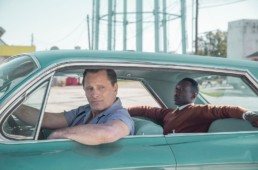‘Green Book’ Review: Touring the Deep South, 1962
This is a custom heading element.
In turbulent times such as the present, can a movie successfully discuss racial history, while still leaving eager Christmas audiences feeling good?
Awards contender and director Peter Farrelly’s first venture into dramatic territory, Green Book, aims to answer that question. 29 years ago, Best Picture winner Driving Miss Daisy aimed to do something similar, telling the story of a black chauffeur hired to take around an old woman, resulting in a sentimental friendship. As Spike Lee will remind you any chance he gets, that film is dicey in its depiction of racial sub servitude, and so the years have not been kind to Miss Daisy. Modern audiences have realized that the same year, a more relevant and well-executed film about race was released (yes, that’s Spike Lee’s Do The Right Thing).
Many wide-appealing films about racial friendships have been released over the years, but Green Book is seemingly the first to directly revert Daisy: this time, it’s a white driver driving around a gifted black jazz pianist. Tony Lip (Viggo Mortensen, in a transformative role) is an Italian bouncer with a hint of bigotry but without a job to match his tough guy attitude. Unexpectedly, he gets a call from Dr. Don Shirley (Mahershala Ali, similarly disappearing into his role). Shirley is a high-brow man of academia, defying the crude stereotypes associated with African-Americans even today. Through the course of the film, we watch as these two misfits, each playing against the traditional role of their race, navigate the Deep South and make their own journey toward friendship.
On paper it sounds like all the boxes being checked for awards victory, right? The result may appeal to some voters, but the undeniable reality is, this is a mild movie. It’s the equivalent of something you consume with little flavor that merely qualifies as filling enough to hold you over until breakfast. With a film entirely about two characters learning to meet in the middle, and no other plot elements to sustain 130 minutes, the film rests its entire weight on Mortensen and Ali, who are up to the task but cannot make up for a lack of any other compelling elements. We skim through a series of episodes where the racial laws and relationships are tested, and these two characters have to figure out how to respond. Complex themes are addressed but never elaborated on. Why are these Southerners comfortable listening to Dr. Shirley play music and shaking his hand afterward, but still occupy a place of bigotry? How does Northern racism differ from Southern? The unanswered list is long. Even the theme of sexual orientation followed by acceptance is addressed… then skimmed over without any consequence to the story. The slow burn nature of it means the same approach is taken with nearly every development: it comes in, we sit with it for a few minutes, then move on.
And because the film is loosely based on a true story, we’re given a saccharine conclusion that feels hard to believe and a little too neat for a country that’s far from resolved its race relations.
This all goes without mentioning the questionable racial relationships that the film portrays. Indiewire and Shadow and Act have already written about its problematic portrayal of a black character as merely a vehicle to bring the white character to a more tolerant place. The overall takeaway is that because one of the writers was the son of real-life Tony Lip, and because Dr. Shirley was allegedly much more secretive about his life, we inevitably get a well-defined white character and a more ambiguous black character. As those articles mention, this comes across as irresponsible research to favor a white savior story.
Their points are valid and I’m glad to have read them before writing my own. I’ll bring up one detail that, to no surprise, is irritating. Our introduction to Dr. Shirley as a man of sophistication shows his apartment as ornate with treasures from around the world, setting the stage for him as a worldly man of culture. Guess which prop gets the most prominent screen time? Two full-size ivory tusks. Tony is clearly intimidated by them, there’s a quick joke, and Dr. Shirley nods his head as if to justify them. Anyone who reads my reviews knows ivory is an immediate red-flag issue for me, and this handling of it is unsurprisingly misinformed. Ivory, especially in this period, would undoubtedly have arrived in Dr. Shirley’s hands at the result of slave labor (not to mention the killing of an elephant). All ivory is exploitive, and the association of ivory with sophistication is downright disturbing to see in a 2018 release, and doubly insulting considering the man is African-American, as well as a pianist. Steinway, the piano brand of choice in the film, stopped using ivory for their keys in the 1950s. This brief moment, to be overlooked by most, speaks to me as ignorant and regressive.
Moving on, the depiction of music is actually a highlight of the film: Dr. Shirley plays jazz but yearns to play more classical music. Some incredible sequence of movie magic show Mahershala Ali playing piano like a maestro: it’s an understated feat in visual effects. As a Chopin fan myself I could’ve asked for more of these moments and not been unsatisfied.
Other than that, Green Book is much more of an embrace of traditional Americana than a critique. Tony Lip loves his food (watching Mortensen eat may be the most entertaining part of the movie), and the movie would rather celebrate Kentucky Fried Chicken than reflect on the brutal stereotypes associated with fried food and African-American culture. Tony’s hyper-masculine, tough guy approach to problems is aptly critiqued, yet in the end, it is celebrated (notably with a cringe-worthy moment involving a gun). And because the film is loosely based on a true story, we’re given a saccharine conclusion that feels hard to believe and a little too neat for a country that’s far from resolved its race relations.
All this to be said, Green Book is likely the safest choice of awards movies to take an entire family to this season (excluding the new Mary Poppins). Without looking closely it is harmless and inoffensive. It may wear that as a compliment, and undoubtedly this was its intention. Yet even in turbulent times, we as a collective consciousness are beyond movies with such simple views on black/white race relations. Every movie that attempts to simplify (thinking of Blind Side and The Help) may taste sweet in the present moment, but ends up having the lifespan of bubblegum and fails to teach us anything meaningful with regards to race. Green Book feels as egregious (if not more) than the other movies in this subgenre. With its awards frontrunner status in mind, it seems like this celebration is largely misguided, and should be reserved for more deftly executed and forward-thinking films, of which there are many. We’ll see how this unfolds.
‘Green Book’ is rated PG-13 for thematic content, language including racial epithets, smoking, some violence and suggestive material. 130 minutes. Now playing in theaters everywhere.
H. Nelson Tracey
Nelson is a film director and editor from Denver based in Los Angeles. In addition to writing for Cinemacy, he has worked on multiple high profile documentaries and curates the YouTube channel "Hint of Film." You can check out more of his work at his website, hnelsontracey.com


